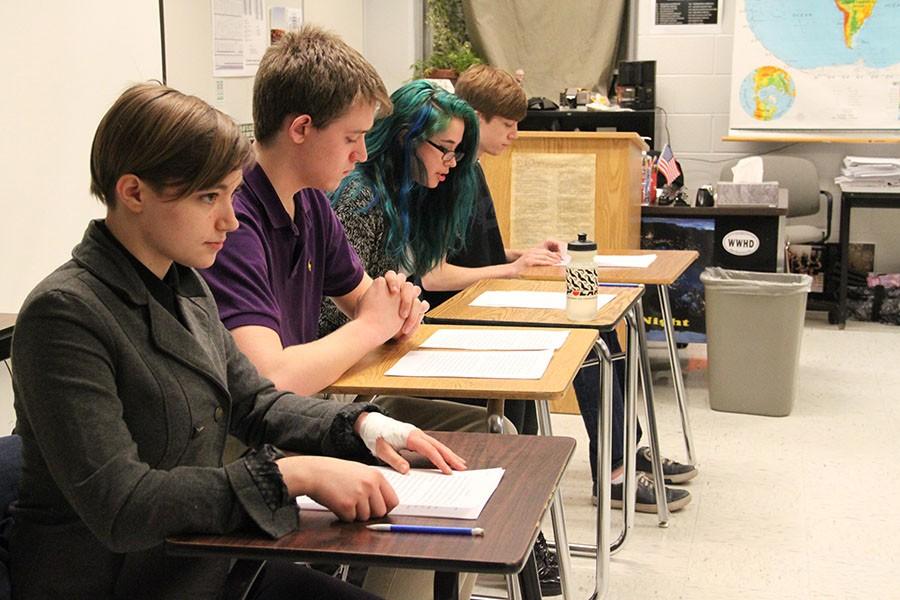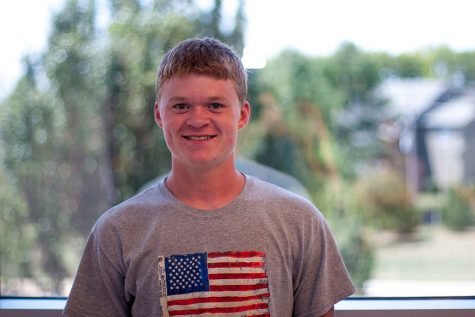United we stand
April 15, 2015
The judges walk into the room and the students introduce themselves. A carefully written paper is read, and the judges start asking questions. The students answer to the best of their ability, despite their nervousness. The judges, highly esteemed government officials and professors of law, are assessing the students knowledge of the Constitution and the U.S. government.
This is an example of what the BVNW We the People team will be experiencing during their national competition in Washington, D.C April 24-27. They placed first at State in Feb. According to senior Anna Koz, a member of We the People, the class itself is similar to the AP Government class. She said the first semester is mostly the AP curriculum and the second semester is more of the competition aspect.
“We the People is basically a constitutional debate,” Koz said. “We argue certain points of the Constitution and the Bill of Rights, things like freedom and the rights that we have and the history of the United States. Every year we get new questions for each of our units which we use to make a paper, and then we argue those points.”
According to government teacher Ken Thomas, the class applies government documents and laws to civics, the interaction of individuals and their society. The class also involves in-depth research and going further into topics discussed in AP government only briefly.
“We spend extensive amounts of time on the questions, ‘Why did we create [the Constitution] that has lasted over 200 years and is the longest-lasting nation state written constitution in the history of mankind?’” Thomas said. “And, ‘Why has that document endured for so long?”’
Senior Lauren Baumert, a student involved in the We the People, said there is a lot of work that goes into preparing for nationals. The class is divided up into units, and each of these teams has to write three papers about questions given to them by the Center for Civic Education. During the actual competition, one of the papers will be read to the judges, who then cross examine the team for 10 minutes. According to Baumert, to prepare for these competitions, students have to know a considerable amount of facts beforehand so they are more capable of answering the judges’ questions.
“It is kind of the same thing as State, but we are going to have to do a lot deeper research,” Baumert said. “The judges are going to be a lot tougher than at State, and so [we will need] more background research and staying up with current events. If there is a court case that is decided the day of one of our rounds, we can be asked about that, so we have to make sure we stay up with that.”
Thomas said one of the things the teams do to prepare for the competition is bring in members of the community to act as judges to help the teams prepare.
“We [bring in] quite a few attorneys…we have former We the People students who come back and work with the kids,” Thomas said. “Teachers like Mrs. Anderson will help, Mr. Christensen will help, we have [school] board members come in, so we have a wide range of individuals who are willing to go ahead and donate their time to the program.”
Thomas said another important aspect in preparing for competitions is learning how to work as a team. In Oct., the students were divided into groups that they work with the rest of the year. That group has to work together to write papers and prepare responses for the question and answer period. Thomas said these teams have to work as a coherent unit in order to be successful.
“One of the highlights of the program is the students really have to learn how to work as a team,” Thomas said. “They have to have one person’s strength help overcome another person’s weaknesses.”
Senior Brandon Strecker, another member of We the People, said he likes the competition and likes going deeper into the subjects they study by doing more research, and he said the class and competitions are rewarding.
“I really like it,” Strecker said. “It is one of the best choices I have made senior year, in terms of classes, just because there are people in there that I would normally not [choose] to hang out with or be in classes with. It is a class where you would kind of take your AP US History knowledge and some other knowledge from a few other classes like economics or something and combine [them].”
Koz said she thinks it is a fun and laidback class. She said it does not simply consist of working on the papers for the competition; she also enjoys socializing with her peers. She said there is a large amount of work to do outside of class, such as studying the entire Constitution, but overall the class is enjoyable.
“I like the actual competitions where you get to talk about your opinion on certain things which you don’t really get asked about usually,” Koz said. “I mean, no one stops you on the street and asks you what your opinion is on [a controversial topic]; it is kind of fun to talk about.”



